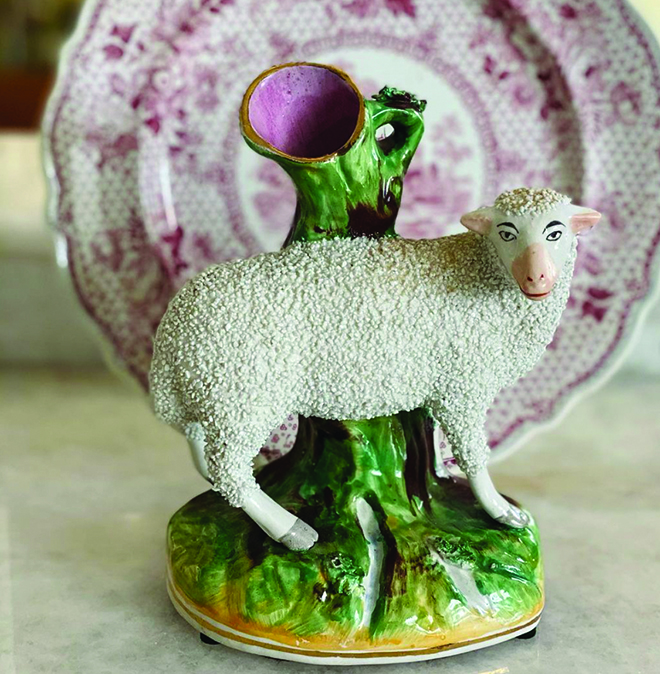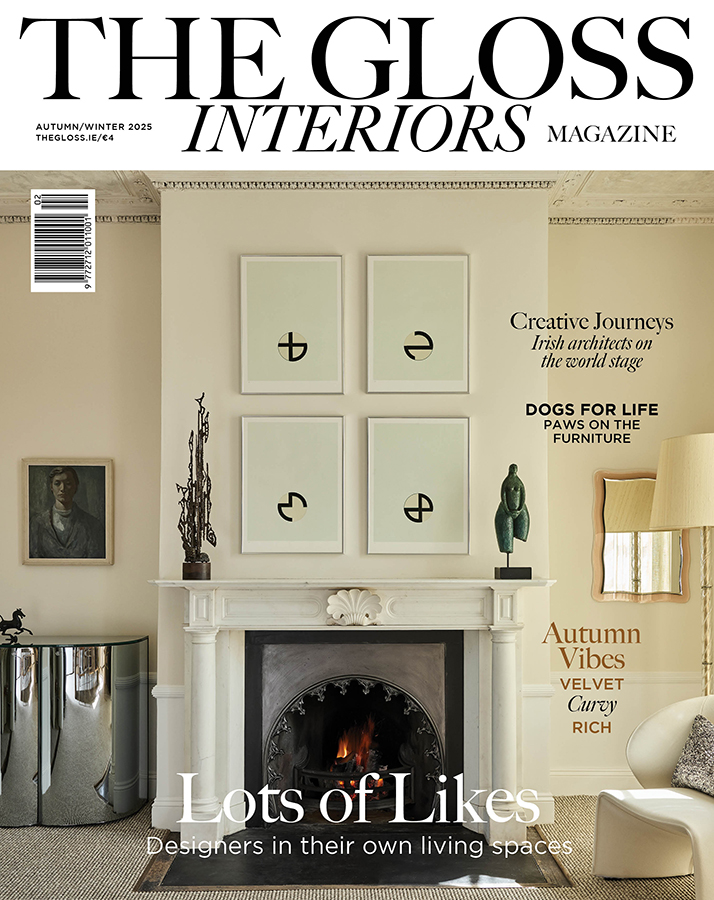Polly Devlin’s obsession with collecting even extended to flocks of fancy farm animals …
Once upon a time I drove down the deep lanes of Dorset with my taciturn and somewhat sullen Ron who looked after the creatures on what I called, with a certain slyness, my farm. I collected animals and birds as well as – well – stuff. Not that I let on. It all just somehow happened, rescue, sort of, innit.
This piece of land of some 200 acres, far from being productive, was a Petit Trianon which haemorrhaged money and where pink ribbons were practically tied around the necks of the manky self-shearing sheep. In my innocency (I got that word from a plaque which commemorated an old lady in a church in Mayfair) I thought that if they were self-shearing as sort of promised in their name, then they would surely groom themselves in a discreet salon in a corner of field. Instead, they rubbed against every thistle, thorn, and fence so their fields looked like those encampments I used to see on side roads in Ireland.
I was heading to a valley in Dorset where two Highland Cattle were up for sale and my collector’s nose was twitching, god love me. Highland cattle are huge hairy reddish-brown creatures with fringes low over their foreheads. They look proboscidean, like the descendants of woolly mammoths. Adorable, as Marie Antoinette might say. Or not. I wanted them to decorate my fields. That’s the unholy truth of it. What was I like?
In my first sentence, down the deep lanes comes from a miraculous poem, “Last Load” by Ted Hughes about getting the hay in before it rains and though he writes about hay bales and our hay was still made into stacks, reading it makes me shiver, not exactly with nostalgia but with memory at its most painful and piercing and dumps me back to childhood and riding home on top of the loaded stacks on the old iron-wheeled hay-lifter, a real bone-rattler, up the Brae Hill past the well where Maisie tried to drown herself, past the hovel where a woman who looked like a witch lived in dire poverty, past the pub, and so to the huge hayshed in the haggard where the hay overwintered. Ted Hughes’ load was pulled by tractor and ours by our old great grey shire horse Nellie whose vast round rump was the roundest thing I’d ever seen.
When the cattle arrived and came scampering down the ramp into a field, I was filled with a delight which lasted for years. They’d come over as I opened the gate, not scampering as they grew older, but moving ponderously, to eat apples off the palm of my hand. They were called Maisie and Dora. I wish I had them in my back garden in London, but I fear NIMBYS might object – plus one swing of their tails would knock the house down.
It wasn’t just dogs, cattle and sheep and horses and mad geese (they lived till they were over 20 and were always furious) and ducks and parrots and bull terriers and eight dogs that surged around – the stars of the show were my fancy hens. I could sing their names – Barred Wyanottes, a Buff Orpington rooster (very buff – the hens groaned when they saw him coming, ahem) Cuckoo Marans, the fabulous Ancona Beetle, green with white spots, the Silver Grey Dorking, the Blue Cochin and the Black, the Gold Brahma, with fat feathered legs, and the Frazzles, their feathers standing upwards and out like a frazzled mane (I think that is where the word frazzled comes from) and of course the Rhode Island Reds, familiars around the house in Ireland. Wickedly fierce bantams – White Polands with cute pom-poms waggling on their heads like Las Vegas showgirls and Silver Pencilled Hamburgs – would chase me out of their enclosure if they had a mind to. Bantams have no idea they are little, like Napoleon and dachshunds, but the way they’d run at me, with their heads stretched out and their wings flapping like a jumbo jet that can’t take off … I didn’t dare laugh.

A Staffordshire China Sheep.
Not much brings you closer to the reality of life than a hen in the hand and an egg in a nest. Even the most sophisticated streetwise child (who sometimes had no idea that eggs came from a living creature) beamed with vivid and immediate pleasure when he or she found an egg under a hen. Some hens live for years and years, but when I noticed that a Buff Orpington had got a fit of the staggers I asked Ron – wearing his default look of fed-upness and who could blame him – “Will I get the vet in?” he uttered three of the best words in the English language. “Let it bide.”
I stopped fretting and it bided. (Ron was one of the last people in Somerset to speak the native dialect and once said to me about my husband when he proposed to cut down a decaying tree: “ ’Ee make I savage”.)
I was mindful of the luxury involved in these obsessions. Someone had to feed them, clean out the stables and henhouses, tend their acres, all a daily scramble to keep them well and it wasn’t me. Animals need. All the time! Need. Just like children! And men! And me!
Hens are recognised as stupid but in fact they are much, much more stupid than they’re given credit for and so are English white bull terriers. Ours was exquisitely stupid. Staring at a whitewashed wall for half an hour gave her great intellectual pleasure. A beam once fell on her head, and she shook it off without a hint of bother on her. I am pleased when things live up to or rather down to their given reputations.
I miss my animals. Anyone who has lived with or worked with them and has not closed their heart and mind to their natures knows that they have the attributes you would hope to find in the perfect human companion. I only have one dog now – I once had eight – a strange little thing from Cyprus to whom I am devoted. Loving, patient, grateful, forgiving, cleverer and fuller of divination than many of the people in whose company I have had to spend an hour or two.
Pope Pius XII, our spiritual leader throughout my childhood, his teachings relayed to us from the altar by a priest whose pleasure was hare-coursing, said with that horrible ring of infallibility of the truly wrong, that the cries from an abattoir should not arouse unreasonable compassion “any more than do red-hot metals undergoing the blow of the hammer”. He can never have looked into the eyes of a living animal with any kind of understanding, any tender-heartedness, yet he led and defined a church supposed to be based on love and charity.
But all is not lost in the secular realm. I have a big, unorthodox flock of sheep, utterly charming and self-shearing to a degree, Staffordshire lambs and sheep, many of which I found over the years in a wonderful antique barn in Ballinderry, alas now closed. The highest price I ever paid was £30. I just looked one up online and had to cover my eyes at the price. Collecting can be a Good Thing.
LOVETHEGLOSS.IE?
Sign up to our MAILING LIST now for a roundup of the latest fashion, beauty, interiors and entertaining news from THE GLOSS MAGAZINE’s daily dispatches.




